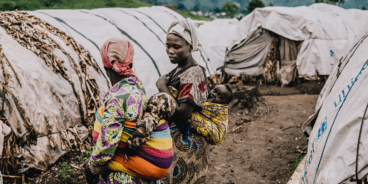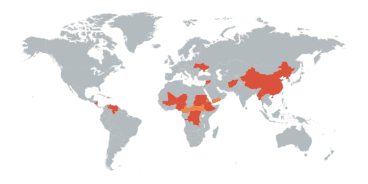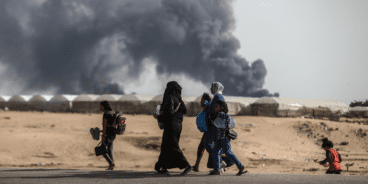
Meeting Summary: The Responsibility to Protect: Responding to Imminent Threats of Mass Atrocities, 4th Annual R2P Ministerial Meeting
Coinciding with the opening of the 66th United Nations General Assembly (UNGA) the Kingdom of the Netherlands and the Republic of Guatemala, along with the Global Centre for the Responsibility to Protect, co-hosted the fourth annual Ministerial Meeting on the Responsibility to Protect (R2P). The meeting opened with statements from the two principal hosts, H.E. Dr. U. Rosenthal, Minister of Foreign Affairs for the Netherlands, and H.E. Mr. Haroldo Rodas Melgar, Minister of Foreign Affairs of the Republic of Guatemala. Mr. Bruno Stagno Ugarte, former Foreign Minister of the Republic of Costa Rica, moderated the discussion with special comments from the United Nations (UN) Secretary-General, H.E. Mr. Ban Ki-moon.
The 2011 meeting was notable for the large number of countries who participated; 25 in total, including 10 at the Ministerial level. In all there were 10 representatives from Europe; 6 from Latin America; 2 from Africa; 1 from Asia; 2 from Oceania; 1 from North America; and 3 from the Middle East and North Africa (MENA). Notable this year was the number of “new voices”, including increased representation from Latin America and the MENA region. These countries brought fresh perspectives to the ongoing discussion about how to operationalize R2P. There were also several countries that attended the Ministerial Meeting as observers. As always, the meeting was conducted under the Chatham House Rule.
Key Themes of Discussion
Preventive, mediated and coercive measures: The tone of the meeting was set by the opening statements of the co-hosts, which incorporated the notion that with R2P there are “no one-size-fits-all solutions.” A number of governments spoke about the historical significance of R2P in relation to Libya and UN Security Council resolutions 1970 and 1973. Although the military actions resulting from 1973 have received wide attention, one Minister emphasized the historical importance of resolution 1970, which was framed in terms of R2P and passed unanimously.
A number of governments articulated strong support for the pillar one and two aspects of R2P via preventive diplomacy. In the words of one Minister, while it was recognized that there “was nothing else that could be done other than going into Libya to protect” civilians at risk, “prevention is better than cure.” A broad spectrum of countries from across all regions spoke of the need to maintain all three pillars of R2P. One Minister strongly emphasized that in responding to mass atrocity crimes, the international community “must strike the balance between preventive, mediated and coercive measures.” The consensus view was that, “early engagement is preferable to late intervention.”
While governments spoke emphatically in support of pillars one and two, they also stressed that there was no avoiding pillar three and coercive measures–up to and including military force. In this context, one Minister emphasized the need for “responsibility while protecting.” There was broad agreement that while military intervention should always be “a last resort” in response to mass atrocity crimes, countries should not avoid timely coercive action to halt the actions of determined perpetrators. In the words of one Minister, R2P had undoubtedly “saved lives” in Libya and Côte d’Ivoire this year.
Operationalizing the norm: A number of governments emphasized that they had taken “concrete steps to operationalize R2P” since the last Ministerial Meeting a year ago. The most “developed” examples of these steps included appointment of a senior official as a R2P Focal Point within their government and attempts to incorporate R2P planning into national foreign policy. Several participants commended the United States government for its efforts in establishing an inter-agency review of its mass atrocity prevention capacities. There was broad support from participants with regards to the work of the UN Joint Office for the Prevention of Genocide and the Responsibility to Protect. The need for increased national, regional and global preparedness in response to mass atrocity crimes was a persistent theme.
A number of governments spoke of the need to improve the international community’s responsive capacity, whether via R2P Focal Points or by other means. One government spoke of the need for “a fresh mobilization around R2P,” and the need to rebuild broad political support for R2P in the post-Libya environment. Participants also recognized that there was a need to strengthen the link between the Human Rights Council and the UN Security Council with regard to emerging R2P risk situations.
Consistency in application: A number of countries spoke of the need for consistency in applying R2P. The difference between the UN Security Council’s rapid response to mass atrocities in Libya as compared to the slow response in Côte d’Ivoire, or the wholly inadequate response to crimes against humanity in Syria, was widely remarked upon. A poignant contribution was made by a Minister who noted that, “responsibilities should apply everywhere – Syria included.” Related comments were made by several governments in terms of the enduring need for clarity of purpose, tight interpretation of R2P mandates, and consistency of application. As one Minister argued, “whenever the international order is weakened, those who are the most vulnerable will suffer the most.” Participants emphasized the need for the international community to learn from the experience of Libya and Côte d’Ivoire.
Contribution of the UN Secretary-General
The Secretary-General participated for the first time in the annual R2P Ministerial Meeting. He described how the principle of R2P “has gone from crawling to walking to running” in just a few short years. While the Secretary-General acknowledged legitimate concerns about the need for the consistent application of R2P, he said he “would far prefer the growing pains of an idea whose time has come to sterile debates about principles that are never put into practice.” The Secretary-General commented that no country in the world challenges the existence of R2P. Rather, the debate had shifted to the appropriate application and operationalization of R2P. Echoing the comments of several Ministers, the Secretary-General remarked that, “we far prefer early engagement to late intervention.” In his concluding remarks, the Secretary-General said that the annual R2P Ministerial Meeting played an important role in “charting the way forward.”
Conclusion
There was a general feeling that the meeting was successful with a high level of attendance and a diversity of views expressed. There was no retreat from the R2P norm, despite recognition of the ongoing need for clarification and discussion regarding “operationalizing the norm” within national, regional and international institutions. While participants at this year’s Ministerial Meeting did not shy away from difficult questions regarding the application of R2P, strong support existed for the notion that “our collective efforts have to continue to be formed by success and failure.” In the words of one government, the “R2P concept is here to stay.”
In this context a number of participants noted the need for work over the next year to deepen and develop R2P. In particular, participants suggested that there was a need for further research on targeted sanctions; on a military doctrine for intervention, including the notion of “responsibility while protecting”; and especially upon developing non-coercive preventive capacities. Overall, participants viewed ongoing debate as playing an essential role in strengthening the R2P norm and clarifying its applicability to specific situations.
Related Content


